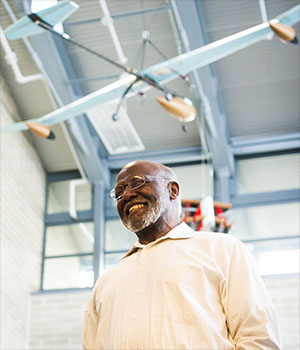
Wesley Harris
(he/him)
Aeronautics and Astronautics
Transcending boundaries
Professor Wesley Harris looks out for his students whether their struggles are research related or personal. “Anytime I come across [Harris] in the hallway,” one student nominator writes, “I know I can always speak my mind and …get some insightful guidance and unwavering support back.”
Wesley L. Harris is the C.S. Draper Professor of Aeronautics and Astronautics at MIT. Harris joined the MIT faculty in 1972. He has since served as Associate Administrator for Aeronautics at NASA, as Vice President of the University of Tennessee Space Institute, and as Dean of the School of Engineering at the University of Connecticut. Harris’s research foci include fluid dynamics, unsteady aerodynamics, and aeroacoustics. His research extends beyond the field of aeronautics and astronautics to include the microcirculation and hemodynamics of sickle cell disease as well as studies of lean financial management methods and the sustainment of capital assets.
Broaching tough topics
In Spring of 2015 after MIT had witnessed several suicides on campus, Harris dedicated an entire lecture of his Analytical High Speed Aerodynamics course to talk about suicide with his students. Harris wanted to understand the situation more clearly so he could better help. Having such courageous conversations with students is a Mentoring Guidepost identified by the C2C program.
“I was truly touched by his effort to communicate and I could tell he really cared,” one student remembers. “I had never seen a faculty member try this hard to bridge the divide [between faculty and students] until then and I have not seen another faculty member try and do the same since.”
Harris looks out for his students one-on-one as well. When students are feeling low or uncertain, they reach out to Harris for much needed guidance. Often, one meeting turns into two or three and before long, students find themselves back on a productive track.
“I was most impressed with his willingness to listen,” a student remarks of one such meeting. With insightful questions and encouragement, Harris was able to give the student hope in a very stressful situation. The student says that thanks to Harris they are able to approach stressful situations differently and can now face them as learning opportunities.
Learning to work together
The relationship between a faculty mentor and their graduate student is one that requires mutual respect and trust. Harris notes that especially initially, “the power balance favors the faculty member in the partnership. Hence, it is incumbent upon me to reach out to my students,” a Mentoring Guidepost.
Cultivating a supportive lab environment requires active participation by all members. “Our research teams are living, learning enterprises that retain and expand knowledge by sharing experiences,” Harris says. Students in the Harris lab regularly present research updates to their lab mates. In these meetings, Harris and each attending student offer the presenter both critical and encouraging feedback. Harris affirms, “Our community is never a no-praise zone.”
